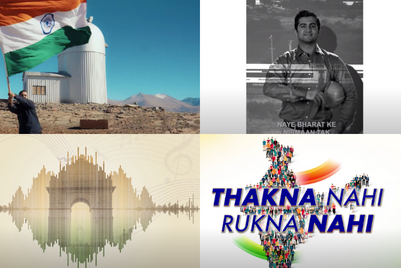
The heroes of Bollywood and cricket have typically dominated celebrity endorsement of brands in India. Signing up a leading man from the film industry, such as Shahrukh Khan, or a cricketing legend like Sachin Tendulkar provided a quick-fire way to mass awareness and credibility in a nation obsessed with both pastimes.
However, as India’s consumers become increasingly prosperous and discerning, deployment of the 'one size fits all' celebrity is reaching its saturation point. The portfolio of brands endorsed by megastars is so wide that it largely dilutes a specific association with the brand. Last year Khan alone endorsed 25 different brands, ranging from home décor to skin-lightening creams and luxury products.
Subsequently brands in India are looking to develop distinct brand personalities and more meaningful engagements with celebrities – signaling a move from celebrity endorsement to genuine ambassadorship.
The increasing diversification of domestic film to address modern urban audiences has created a new generation of stars. Young film talents, unlike their predecessors, have developed more consistent media profiles due to their casting in new Bollywood genres such as modern romantic comedies. A new generation of actresses, including Sonam Kapoor, Deepika Padukone and Genelia D'Souza, have become representative of the modern and international lifestyle of the growing urban middle class.
Kapoor, for example, has proven particularly attractive to brands due to her reputation as a style icon. She has become the face of L’Oreal and Electrolux, represented by both brands as a busy, modern, international woman to help the companies provide guidance and build intimacy with aspiring young women.
Simarly, Padukone and D’Souza – both popular for their cheeky attitude to traditional romance – have been used by Nescafe and Fast Track (Titan’s youth brand in India) to communicate a fresh and irrelevant attitude defining India’s Generation X.
For Nescafe, Pakudone portrays a woman in control, comically leaving male pursuers in her wake as she calmly sips her regular cuppa. D’Souza portrays a similar attitude in an advert for Fast Track when she decides to check-in her boyfriend at the airport as baggage - metaphorically answering the company’s brand slogan 'Move on'.
Another emerging approach to celebrity is focusing on a specific aspect of the personalities and lifestyles of established stars. Aamir Khan, who established himself as a heartthrob hero during the 1990s, has more recently produced and starred in a series of innovative hits that have served to redefine Bollywood as a genre.
His new reputation as an auteur has proven a powerful complement to Samsung’s series of new handsets, including the local Samsung Hero. Khan deliberately pokes fun at the typecast of a Bollywood hero to highlight the phone’s new features – including a frank assessment with fans that the phone is the true hero.
Another example of a former star being recast to promote brands is Kajol, a leading film star who famously cut her career short to raise a family. As the face of Unilever’s Knorr soup, Kajol became the spokeswomen for the slogan 'Tummy bhi khush, Mummy bhi khush' (If your tummy is happy, so is mummy). Using Kajol’s media image as a dedicated and modern mother, Knorr had the credibility to introduce a new occasion to urban Indian households – the idea of 7pm soup, a nutritional snack for children before their main evening meal.
Celebrities are also working harder for brands by lending their creativity, and not just their image. Local automaker Mahindra launched their multi-utility vehicle Xylo alongside fashion photographer Atul Kasbekar, well known for his Kingfisher swimsuit calendars. His creative lifestyle was seen as a strong match with the escape and flexibility offered by the new vehicle. Mahindra’s decision to go with Kasbekar represented a desire for the brand’s vehicle launch not to be washed out by the ubiquity of a major celebrity.
Similarly motorcycle producer Hero Motor Corp redefined the role of celebrity with its 'Hero within us' campaign. The original TVC, headlined by a composition by legendary musician A.R.Rahman, was expanded to a Facebook and online campaign asking people to upload videos with their karaoke versions of Rahman’s anthem. In a first of its kind, the celebrity involvement shifts from an idolised legend to a positive enabler and mentor – a relationship that mirrors the ambition of the motorcycle producer to facilitate dreams.
The shift in brands’ use of celebrity has been highlighted by Birla Sun Life’s controversial campaign featuring cancer sufferer Yuvraj Singh. Singh, a virile symbol of Indian cricket with his standout performances in India’s home World Cup victory last year, was recently diagnosed with a rare form of cell cancer and currently recovering from chemotherapy in the US. The TVC, shot before Singh was diagnosed, has subsequently been rewritten with the cricketer’s permission to reference his current medical situation – representing an unconventionally personal portrayal of a celebrity, and arguably a very powerful communication by the life insurance brand.
Brands now seem determined to ensure celebrities are extending the brand story, rather than simply providing star appeal. In the clutter of India’s morphing mediascape, the need to avoid the stereotypical and deliver the substantial is leading to new brand relationships with celebrities – a move from endorsement to true brand ambassadorship.


.jpg&h=334&w=500&q=100&v=20250320&c=1)
.jpg&h=334&w=500&q=100&v=20250320&c=1)

.png&h=334&w=500&q=100&v=20250320&c=1)

.png&h=334&w=500&q=100&v=20250320&c=1)

.jpg&h=334&w=500&q=100&v=20250320&c=1)



.jpg&h=268&w=401&q=100&v=20250320&c=1)



.jpg&h=268&w=401&q=100&v=20250320&c=1)

.png&h=268&w=401&q=100&v=20250320&c=1)